In 2007, Mattel discovered excessive levels of lead in some of its imported Fisher Price toys. It immediately recalled millions of toys and self-reported the violation. Nevertheless, it has been hit with class action lawsuits. And if you ever had any doubt that the CPSIA was an overreaction and unnecessary to protect consumer safety, Mattel last week paid $2.3 million in fines for the violation of pre-CPSIA law. [CNNMoney via ABAJournal]
Posts Tagged ‘CPSIA and toys’
A CPSIA future?
“My fear is that the offerings of toys will finally be whittled down to the top 40 manufacturers, and everyone from Wal-Mart to FAO Schwarz will have to source the same things from the same places, manufactured as cheaply as possible.” [Linda Hays (Hopscotch Toys, McMinnville, Ore.), ToyDirectory.com] More views from toyland: Handmade Toy Alliance and Cecilia Leibovitz; Rick Woldenberg in Roll Call and at Lenore Skenazy’s Free Range Kids.
Pull over, sir, we’re checking those socks for lead
More on CPSIA’s costs: “Even though there is no evidence that his company’s hosiery contains lead, his company will be forced to pay more than $500,000 on lead testing over the next year,” said David McCubbin of Oklahoma’s McCubbin Hosiery. And so long, giraffe teethers:
Suzanne Lang, owner of Starbright Baby Teething Giraffes in Boalsburg, Pa., created 36 patterns of giraffes last year. To test each of these items for lead and phthalates would cost up to $81,000, she said. She only grossed $4,500 last year.
Unless the law is changed, “thousands of small businesses and crafters will be put out of business in this already tough economic climate,” Lang said.
Last month the office of Rep. Diana DeGette (D-Colo.), a co-sponsor of the measure, “said the bill is doing exactly what it is meant to do“.
For CPSIA reform, unexpected bedfellows
It’s often been observed that the movement to reform CPSIA brings together people with remarkably diverse cultural, political, and social backgrounds, in a coalition that includes small-town woodcrafters and urban libertarians, homeschooling moms and regulatory economists, back-to-the-land localists and NPR-fan library administrators, and so forth. In her much-awaited article for the June Reason, now online, Katherine Mangu-Ward profiles people in groups like the Handmade Toy Alliance, Etsy, and the craft-fair world, few of whom ever expected to find themselves in a pitched battle against the regulatory state. Further discussion: Reason “Hit and Run“.
CPSIA chronicles, May 15
Plenty of news in recent days: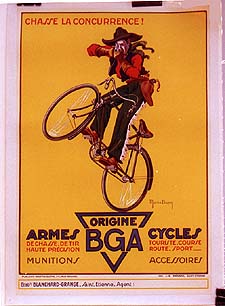
- Ordinary bicycles have now joined youth motorbikes and ATVs in the twilight status of not-quite-legal temporary toleration. That’s the impact of a unanimous (2-0) vote (PDF) by the Consumer Product Safety Commission granting the conventional bicycle industry a two-year stay but not exemption from CPSIA’s lead limits (earlier). Since everyday bikes unavoidably contain some lead that is potentially absorbable (if at infinitesimal levels), they are not legal, exactly, but the Commission promises not to go after anyone for selling them, for now. CPSC acting chair Nancy Nord:
We are compelled to deny the petition because the language of the statute does not give us the flexibility to do otherwise, even though our staff does not believe that lead exposure from using bicycles and related products presents a risk that they would recommend the Commission regulate. The risk assessment methods traditionally used by the Commission in evaluating exposure to lead are no longer available to us under the CPSIA.
Nevertheless, we also recognize, as we did when presented with a similar petition filed by the All Terrain Vehicle industry, that safety requires the presence of some lead in the metal used in the product to insure structural integrity. I am also mindful of the staff’s findings that the contact children may have with the parts of the products that contain lead is not extensive and would not present a risk as we have traditionally understood the term—that is, would not increase blood lead levels in any measurable way. Presented with the dilemma of inflexibility in the law vs the need for regulatory action that recognizes safety and good sense considerations, we are opting to stay enforcement.
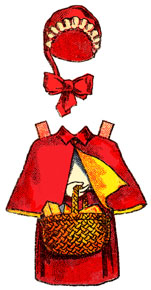
This course of action is becoming all too frequent for the CPSC. It is needed to avoid market disruptions and to protect consumers. However, it is not the optimal way to implement a statute. - On the other hand — and with potentially catastrophic consequences for businesses large and small — the commission by a 1-1 vote (Nord in favor, Thomas Moore against) turned down a stay (PDF) of the tracking label requirements due for August (earlier here and here). Much coverage at NAM ShopFloor, here (decisions on packaging, whether to etch numbers into products, etc. must be made with much lead time and manufacturers now face staggering costs if they guess wrong), as well as here, here, and here.
- Yesterday the House Small Business Committee held its long-awaited hearings, the first in either chamber since CPSIA took effect, on the law’s calamitous impacts on business. I haven’t had a chance to watch yet, but the House Small Business majority (Democratic) side has put up videos. The impression one gets from reform blogs is that 1) the hearing itself was pretty good but that 2) committee leadership then proceeded to ignore much of what was actually said and rally behind the Waxman line that there’s nothing wrong with the law itself, it’s just that the CPSC leadership hasn’t implemented it properly. [Carter Wood, Rick Woldenberg, Woldenberg’s submitted statement]
- Chalkydoodles has a two-part interview with founder Cecilia Leibovitz of the Handmade Toy Alliance: part I, part II (via ExUrbanis);
- CMMJaime takes a look at the CPSC’s new handbook for resellers, and finds its reassurances for small businesses subjective and vague, particularly when it comes to lines like: “Use your best judgment based on your knowledge of the product”.
- “Toy importer Rob Wilson’s company sometimes sells wooden children’s puzzles, but he hasn’t ordered one since last November.” That’s from the Metro-West Daily News in suburban Boston, which also has this ominous political bit:
McGovern [Rep. James McGovern, D-Mass.] said the federal agency is not being onerous, and businesses should work with it to resolve their worries.
In a written statement, Sen. John Kerry’s office said the measure is meant to keep dangerous products off the shelves, and it needs a chance to work before it is changed.
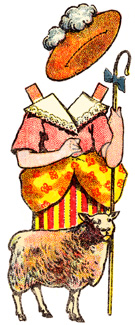
Public domain paper doll images courtesy Karen’s Whimsy.
CPSIA chronicles, May 11
- At long last a House committee — the one on Small Business — has announced a hearing on CPSIA’s impact on small business, to take place Thursday. (I’m almost hesitant to report this as good news since the last time I did so it took only hours for the event to be called off). The Small Business panel does not have primary legislative authority in the area; that is vested in Rep. Henry Waxman’s Energy and Commerce Committee, whose CPSIA-overseeing subcommittee has chosen instead to hold hearings on that very urgent subject of public concern, college bowl championships. Rick Woldenberg recalls the fingers-in-ears techniques the House has used to shut out unwanted information up to now: first Waxman/Rush staffers prearranged “hearings” that heard nothing, after which they (successfully up to now) maneuvered to make sure critics of the law would not obtain any official Hill forum at which to air their grievances as public outrage built.
- The Consumer Product Safety Commission has released new guidance (PDF) for thrift shops and other product resellers on compliance with CPSIA and other laws overseen by the agency. According to Ian at Musings at a Catholic Bookstore , the manual lays out policies that differ only slightly from what was known before, often by spelling out what will be made an enforcement priority, since the commission has no power to alter the law’s actual requirements. Thus it seems phthalates in older kids’ playthings, the kind unlikely to be placed in the mouth, are not going to be a high priority in reseller enforcement — which still doesn’t make it legal to resell those items. For many outside readers the biggest surprise seems to have been that the agency views its authority as extending to yard sales. As Ian notes, this isn’t actually news; it’s just that the new manual is spelling it out in a more visible way than it did at some earlier times.
- “Toy Story 3: Emperor Uncle Sam Puts You Out of Business” [Rep. Joe Barton (R-Tex.), The Hill]
- In the ongoing series of crises that is CPSIA, the next major crisis is due on or around August 14, as of which date newly made children’s goods must comply with new tracking and labeling requirements (touched on briefly in this space last month). The intent is to make it easier to trace and contain safety problems, enable recalls and so forth. For makers of children’s apparel, Kathleen Fasanella explains the complicated and sometimes expensive implications in posts here, here, and here. And apparel makers have it relatively easy, in part because they are already used to affixing permanent labels to most products, unlike many makers of items such as wooden toys and pencils, straw dolls, ceramic wall plaques, rubber spiders or bouncy balls, glass bead craft items, and so forth. Toy importer Rob Wilson writes, “this one clause will be enough to finish off a good majority of the companies that the other provisions of the law do not kill first. I personally know of many companies that are planning to close by August 15th if this provision is not amended.” The National Association of Manufacturers has requested (PDF) an emergency stay on the tracking and labeling rules; the CPSC has put off consideration of the request. Rick Woldenberg comments here and here. And tomorrow (Tues., May 12) at 1 p.m., the CPSC is holding a meeting, to which any interested member of the public is invited, to discuss the tracking and labeling rules. (Update: CPSC hearing is online as a webcast (h/t Woldenberg). Kathleen Fasanella has more, including links to more than 500 pages of protest letters, PDF, received by the CPSC on the issue).
- Cutting across multiple lines: per the Bulletin in Bend, Oregon, a local resident whose son got sick from salmonella (and recovered) appeared with Rep. Henry Waxman at a press conference to promote more effective federal food safety regulations; at the same time, though, “Christoferson said she can sympathize with the harm that poorly written rules can do to businesses” because her own resale store in the city of Bend, Stone Soup, has been harmed by CPSIA.
- Whimsical Walney, who has written with passion about the CPSIA fight, has announced that she is closing the doors of her children’s business.
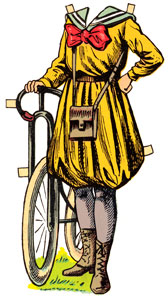
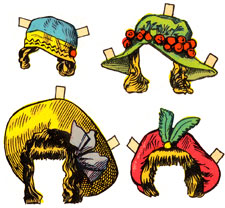
Public domain paper doll images courtesy Karen’s Whimsy.
CPSIA won’t let us build a legal bicycle
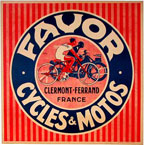 But we shouldn’t let the bike dealers get panicked or anything. Earlier here and here.
But we shouldn’t let the bike dealers get panicked or anything. Earlier here and here.
CPSIA chronicles, April 9
Posting may be slower here over the next few days because of the holiday (and comments-moderation may be erratic at best, for which apologies in advance). If you’d like to catch up with CPSIA reading, though, there’s plenty of it:
- Excellent reporting in the Milwaukee Journal-Sentinel last weekend, based on interviews with local people affected by the law, including a maker of kids’ clothing, a doll maker (more), and so forth. Virtually all of them contribute a striking fact, a memorable quote, or both: “Mark Kohlenberg, owner of the Umi children’s shoe company in Grafton, estimates that the required testing will cost his company $200,000 a year. … ‘This law was written one night in Washington when everyone was drunk,’ said a frustrated Peter Reynolds of the Little Toy Co. in Germantown. ‘It’s impossible to read and impossible to enforce.'”
- Before moving on from the state of Wisconsin, let Valerie Jacobsen’s comment be recorded: “Canvassed Janesville, Wisconsin thrift stores March 31. In an entire city of population 60,000 there was one piece of used clothing for a baby of six months or less”. (Further: ShopFloor).
- A report in the Northfield, Minn. paper on the vintage-kids’-books situation contains a line almost too depressing to pass along: “Congressman John Kline responded and said efforts are underway to change the law, but with the focus on larger budget issues he admitted it could be years [emphasis added] before this gets another look.” More: Deputy Headmistress.
- “The Myth of Good Intentions” [James Wilson, DownsizeDC]
- “$1,500 to test one clutch ball that retails for $16.50”: a letter to President Obama [Jill Chuckas of Handmade Toy Alliance at Change.org]
- Rick Woldenberg, running his family’s educational-toy company, remembers himself as the most apolitical person you would want to meet. How’d he turn into a nonstop organizer of the reform effort? [Story of My Life]
- “When I first heard about CPSIA I actually cried. I didn’t see how they could pass something so stupid.” [11-year-old Lizi, at AmendTheCPSIA.com]
- To grasp the immense scale of Congress’s blunder with this law, “follow a blog like Overlawyered“. Thanks! [Hugh Hewitt, The Examiner; and more, including radio questioning of Sens. Lamar Alexander (R-Tenn.), Ben Nelson (D-Neb.), and John Ensign (R-Nev.)]
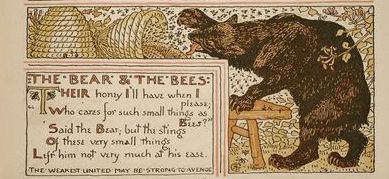
Public domain image from Walter Crane, Baby’s Own Aesop (1887), courtesy Children’s Library.
CPSIA: Things I learned at the rally
Last Wednesday’s CPSIA rally at the Capitol drew an overflow crowd of hundreds, with thousands more reportedly watching from around the world via webcast. Many speakers had powerful stories to tell, and cameras from CNN and ABC were on hand to record them; AP mentioned the event in covering the dirtbike-ban story. There is, as you might imagine, no way to upstage a six-year-old motocross champion who declares from the podium, “I promise I won’t eat my dirt bike”.
A few things I learned by attending:
- Ordinary bikes (not the motorized kind) are clearly out of compliance with the law because of the leaded brass in certain components, and have been given no exemption. I’m still wondering why the CPSC directed the motorbike dealers to tarp over their inventory but did not do the same with the ordinary-bike dealers. Earlier here; much more (PDF) in this CPSC submission by Mayer Brown for the Bicycle Product Suppliers Association.
- Until I saw their handout leaflet, it hadn’t sunk in that the non-profit and charitable giants in resale, including Goodwill, Salvation Army, Easter Seals, Volunteers of America, and St. Vincent de Paul, have banded together in a Donated Goods Coalition. Good for them, and I hope someone listens.
- Even blogging the subject as much as I have, I’ve somehow said almost nothing about CPSIA’s requirements for batch numbering, labeling and tracking of kids’ products, due to hit later this year. It seems these requirements all by themselves will suffice to wipe out small producers in droves even if the crazy testing requirements can somehow be made sane. A few write-ups touching on the subject: Handmade Toy Alliance (Word document), Kathleen Fasanella/Fashion Incubator, Publisher’s Weekly.
- The rally happened because of the efforts of grass-roots business people around the country, above all Rick Woldenberg of Learning Resources. (The story of the Oregon delegation could stand for that of many others.) Motorbike people were much in evidence. Also present: people from trade associations from regular businesses not been much heard from in the CPSIA furor of recent months, including makers of shoes and footwear, cribs, and even household cleansers, all of whom turned out to have stories to tell. Who knew there was a whole association specializing in the little items you get when you put in the quarter in the vending machine and turn the crank?
- Kids’-book author (and valued commenter) Carol Baicker-McKee was there and gave a superb talk, making effective use of a copy of Orwell’s 1984. Otherwise, however, among groups deeply affected by the legislation, the book and library trades were conspicuous by their absence. I wasn’t the only one who noticed this; so did Publisher’s Weekly.
- I finally got to meet face to face many persons who have been favorably mentioned in these columns over the past three months. I was not surprised to find a whole lot of nice, dedicated people, the sort of people you’d want to be making products for your children to use. You, Reader, would have enjoyed meeting them too.
- Many members of Congress spoke. All were Republican, and a few were pretty good. For better or worse (maybe some of each) there was a minimum of partisanship, with scant mention of the reports that the Democratic House leadership had ordered members not to attend. Several lawmakers minimized the institutional role in the debacle of Congress (which passed the law last year almost unanimously), instead seeking to throw the blame onto the CPSC’s management, which put them surprisingly close to the position of Henry Waxman himself. One GOP member said it was important to be nice to the Democrats and not alienate them, since they held all the power.
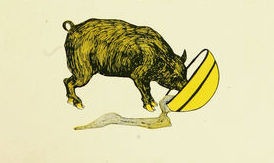 This may have been good advice, but I was still a little surprised.
This may have been good advice, but I was still a little surprised. - Amid a great deal of talk about unintended consequences, very little was said about there being actual adversaries out there, who know quite well what the law is doing and support it anyway. If more than a word or two was breathed about the roles of Public Citizen, PIRG, or the various members of Congress who are actively hostile on the issue (and not just “needing to be educated”), I missed it. Which meant (it seemed to me) that some of the good people who’d taken the trouble to come to Washington were going to be surprised and perhaps unprepared when they discovered figures out there like, oh, just to pick randomly, Illinois Sen. Dick Durbin, whose positions are not so much unreflected-on as deeply hostile (and with mysteriously unsourced numbers too).

Speaking of which, Consumers Union, publisher of Consumers Reports, confirmed once again that it falls into the “hostile” and not merely “unreflective/ uninformed” category with this deplorable hatchet job, which provoked a slew of angry, substantive comments; see also blog posts including those of Carol Baicker-McKee and Sheeshamunga.
More rally coverage: Domestic Diva, Polka Dot Patch.
Public domain image: Yankee Mother Goose (1902), illustrator Ella S. Brison, courtesy ChildrensLibrary.org.
NPR on CPSIA: “Public Concern, Not Science, Prompts Plastics Ban”
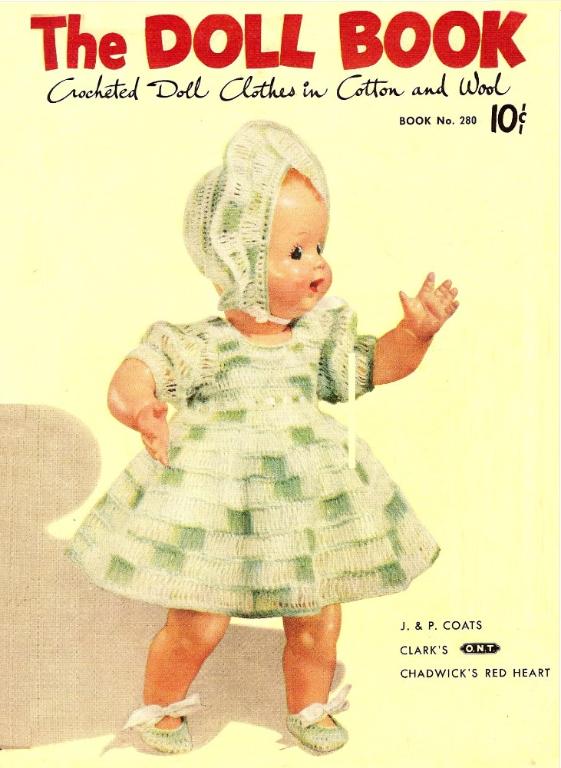
Major story by Jon Hamilton on yesterday’s NPR “Morning Edition”: “A new federal ban on chemical compounds used in rubber duckies and other toys isn’t necessary, say the government scientists who studied the problem.” “Now they tell us,” writes Carter Wood. More from Jonathan Adler @ Volokh and commenters.
Although most coverage of the CPSIA debacle (this site’s included) has focused on the lead rules, the phthalates ban (phthalates are an ingredient often used to make plastic soft and bendable) is also extraordinarily burdensome, for a number of reasons: 1) as readers may recall, a successful lawsuit by the Natural Resources Defense Council and others forced the last-minute retroactive banning of already-existing playthings and child care items, costing business billions in inventory and other losses; 2) vast numbers of vintage dolls, board games and other existing playthings are noncompliant, which means they cannot legally be resold even at garage sales, let alone thrift or consignment shops, and are marked for landfills instead; 3) obligatory lab testing to prove the non-presence of phthalates in newly made items is even more expensive than testing to prove the non-presence of lead. The phthalate ban is also an important contributor to the burden of the law on the apparel industry (the ingredient has often been used in screen printing on t-shirts and similar items) and books (“book-plus” items with play value often have plastic components). AmendTheCPSIA.com has reprinted a letter from Robert Dawson of Good Times Inc., an amusement maker.
Earlier coverage: Feb. 6 (NRDC and allies win court case on retroactivity); Feb. 7 (various points, including Connecticut Attorney General Richard Blumenthal’s vow that his office will “take whatever steps are necessary [emphasis added] to ensure this phthalate ban is enforced”); Feb. 12 (what ingredients in playthings are going to replace phthalates, and are those ingredients going to be more safe or less?); Mar. 4 (vintage dolls); Mar. 11 (California Senators Barbara Boxer and Dianne Feinstein were particularly identified with pushing the phthalates ban to enactment).
P.S. Environmentalists disputing the NPR coverage: Jennifer & Jeremiah @ ZRecommends, Jennifer Taggart (The Smart Mama) in NPR comments. And Sacramento attorney Anthony Caso has a backgrounder for the Washington Legal Foundation (PDF) with more about the CPSC, the NRDC, and maneuvering on phthalates.
